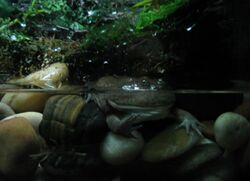Biology:Lepidobatrachus llanensis
| Lepidobatrachus llanensis | |
|---|---|

| |
| Scientific classification | |
| Domain: | Eukaryota |
| Kingdom: | Animalia |
| Phylum: | Chordata |
| Class: | Amphibia |
| Order: | Anura |
| Family: | Ceratophryidae |
| Genus: | Lepidobatrachus |
| Species: | L. llanensis
|
| Binomial name | |
| Lepidobatrachus llanensis | |
Lepidobatrachus llanensis (common name: llanos frog;[1][2] in Spanish: escuerzo[1]) is a species of frogs in the family Ceratophryidae. It is found in northern Argentina , western Paraguay, and southern Bolivia.[1][2]
Habitat and ecology
Lepidobatrachus llanensis is an aquatic frog inhabiting dry scrubland and semi-arid areas at elevations below 300 m (980 ft). Breeding takes place in temporary pools and water tanks on cattle farms. During the dry season these frogs burrow underground, only to emerge again after rain.[1] To deal with dry conditions, they form a protective cocoon[1][3] that greatly reduces the loss of water.[3]
Conservation
Lepidobatrachus llanensis is an uncommon frog living in isolated populations. It is threatened by habitat loss caused by expanding agriculture, wood extraction, and pollution. It occurs in a number of protected areas in Argentina and Paraguay.[1]
References
- ↑ 1.0 1.1 1.2 1.3 1.4 1.5 1.6 IUCN SSC Amphibian Specialist Group. (2021). "Lepidobatrachus llanensis". IUCN Red List of Threatened Species 2021: e.T57112A101428639. doi:10.2305/IUCN.UK.2021-3.RLTS.T57112A101428639.en. https://www.iucnredlist.org/species/57112/101428639. Retrieved 5 February 2023.
- ↑ 2.0 2.1 Frost, Darrel R. (2023). "Lepidobatrachus llanensis Reig and Cei, 1963". Amphibian Species of the World: An Online Reference. Version 6.1. American Museum of Natural History. doi:10.5531/db.vz.0001. https://amphibiansoftheworld.amnh.org/Amphibia/Anura/Ceratophryidae/Lepidobatrachus/Lepidobatrachus-llanensis.
- ↑ 3.0 3.1 McClanahan, Lon L.; Shoemaker, Vaughan H.; Ruibal, Rodolfo (1976). "Structure and function of the cocoon of a ceratophryd frog". Copeia 1976 (1): 179–185. doi:10.2307/1443788.
Wikidata ☰ Q520233 entry
 |


